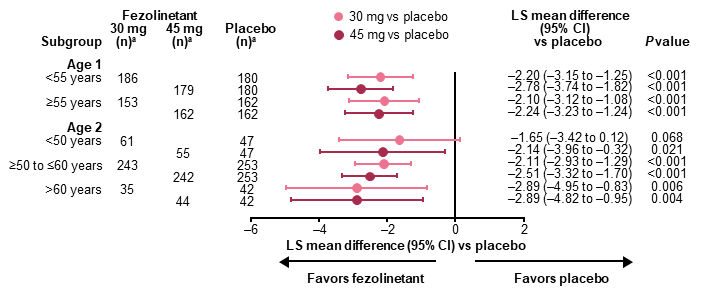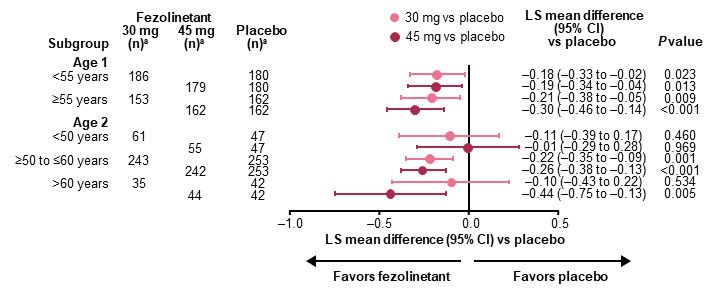
The use of fezolinetant in women over 65 years of age is not contraindicated, although its use has not yet been studied in this age group.
Figure 1. Change in VMS frequency from baseline to Week 12 by baseline age in the full analysis set (all randomized participants assessed according to the randomization at first dose).1

The number of participants with baseline data are shown.
P values were calculated without multiplicity adjustment.
Total number of participants – Fezolinetant 30 mg: n = 339, Fezolinetant 45 mg: n = 341, Placebo: n = 342.
Adapted from: Santoro NF, Menopause, 2024.
Figure 2. Change in VMS severity from baseline to Week 12 by baseline age in the full analysis set (all randomized participants assessed according to the randomization at first dose).1

The number of participants with baseline data are shown.
P values were calculated without multiplicity adjustment.
Baseline results include moderate and severe incidences while post-baseline results include mild, moderate, and severe incidences.
Total number of participants – Fezolinetant 30 mg: n = 339, Fezolinetant 45 mg: n = 341, Placebo: n = 342.
Adapted from: Santoro NF, Menopause, 2024.
Santoro N, Nappi RE, Neal-Perry G, et al. Fezolinetant treatment of moderate-to-severe vasomotor symptoms due to menopause: effect of intrinsic and extrinsic factors in two phase 3 studies (SKYLIGHT 1 and 2). Menopause. 2024;31(4):247-257. Available at: https://doi.org/10.1097/gme.0000000000002340.
Neal-Perry G, Cano A, Lederman S, et al. Safety of Fezolinetant for Vasomotor Symptoms Associated With Menopause. Obstet. Gynecol. 2023;141(4):737-747. Available at: https://doi.org/10.1097/aog.0000000000005114.
Neal-Perry G, Lederman S, Mancuso S, et al. OPTION-VMS: Preliminary Analysis of a Phase IV Observational, Real-World Study of Non-hormonal Pharmacotherapies for Bothersome Menopause-Associated Vasomotor Symptoms [poster]. Orlando, FL, USA. The Menopause Society (TMS) 2025 Annual Meeting; 2025.
Maki PM, Mancuso S, Helbing M, et al. Preliminary Analysis of Work Productivity Outcomes in OPTION-VMS: A Phase IV Observational, Real-World Study of Non-hormonal Treatment for Bothersome Menopause-Associated Vasomotor Symptoms [poster]. Orlando, FL, USA. The Menopause Society (TMS) 2025 Annual Meeting; 2025.
The medical information on this website is for educational purposes only and is intended to provide scientific information about Astellas products. This information is not intended as medical advice or clinical recommendations. This website is for use only by United States residents and licensed healthcare professionals (HCPs) practicing in the United States. Product labeling may vary between countries.
Please choose an option that best describes you:
For visitors outside the United States: click here